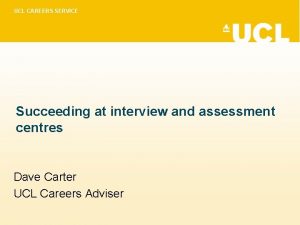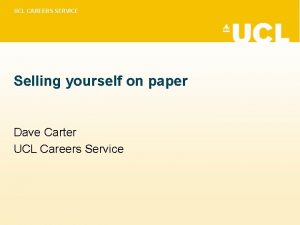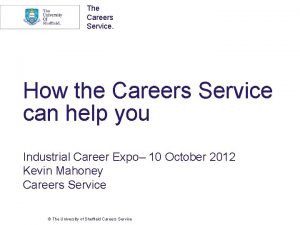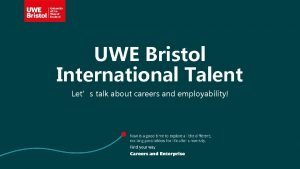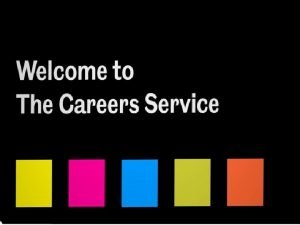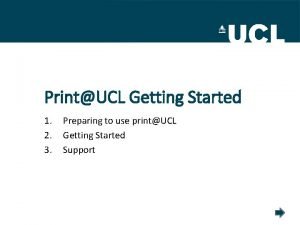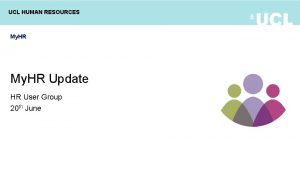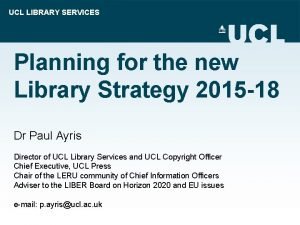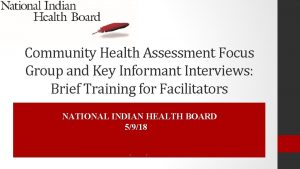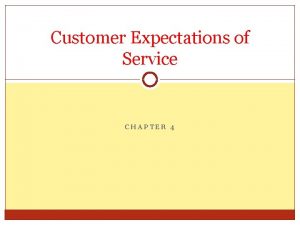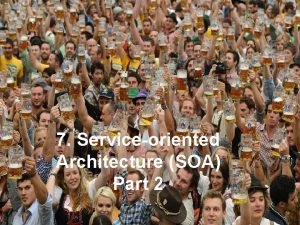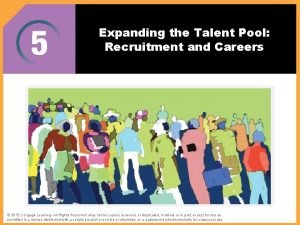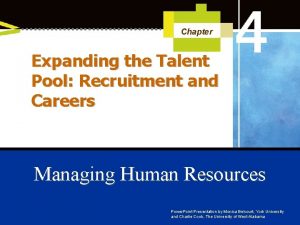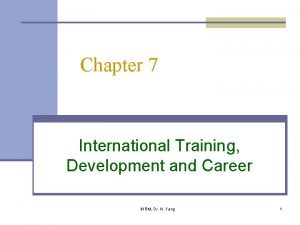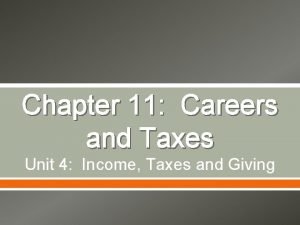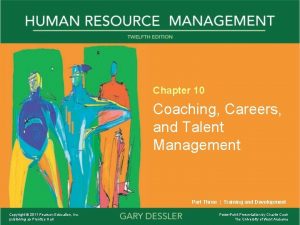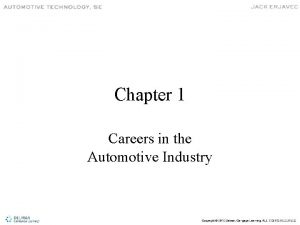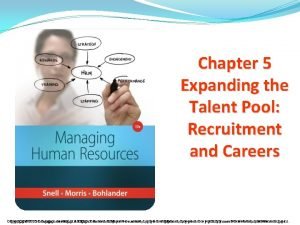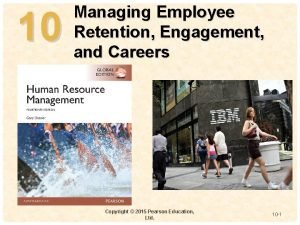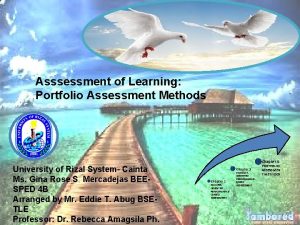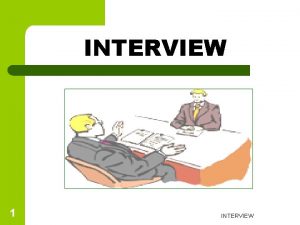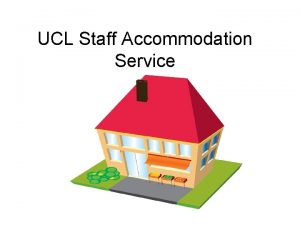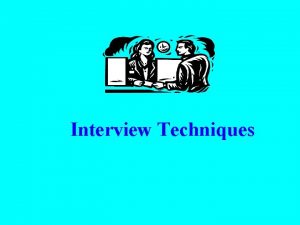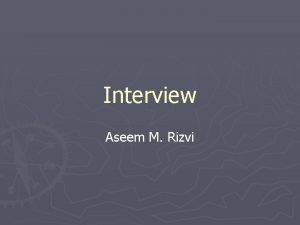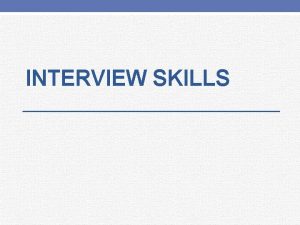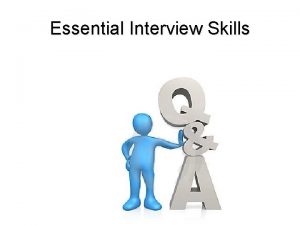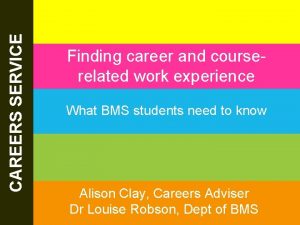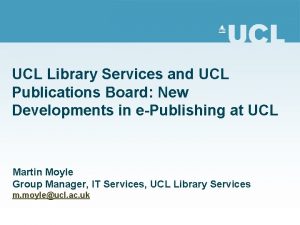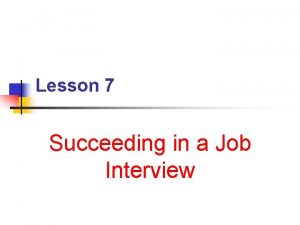UCL CAREERS SERVICE Succeeding at interview and assessment





















- Slides: 21

UCL CAREERS SERVICE Succeeding at interview and assessment centres Dave Carter UCL Careers Adviser

Aims of today’s session • • • gain an insight into what to expect identify the 3 key areas of preparation understand the typical ‘interview dynamic’ learn how to create a good first impression identify types of question and how to tackle them • know where to look for further support 2

Accuracy of Selection Methods Graphology 0% 0% Astrology 0% 25% References 12% 50% Typical interviews 15% 75% Biodata 38% 100% Work sample tests 55% Assessment Centres 68% Personality Tests 38% Ability tests 54% Structured interview using job analysis 63% 3

Public sector recruitment process Pre-assessment centre • Self Assessment – realistic job preview questionnaire – numerical/ verbal reasoning Q’s • complete online application form (20 K) • online reasoning and competencies testing (10 K) • test centre e-tray (3 K) Assessment centre: (1 K) • written exercise – policy recommendation • group exercise – role play • briefing exercise • competency-based interview (350 successful candidates) 4

Psychometric Tests Aptitude: verbal, numerical and diagrammatic. • • administered under exam conditions or online strictly timed – approx. 30 Q’s in 30 minutes multiple choice: right/ wrong answers verbal tests depend on comprehension of the passage not outside knowledge. Personality questionnaires • explore the way you react or deal with situations • not looking for rigid ‘typical’ personality profile • may receive feedback and form basis of discussion at interview 5

Aptitude practice test answers • Verbal reasoning – 1: B 2: A 3: B • Numerical reasoning – 4: B 5: E 6: D 6

Succeeding at psychometric Tests Aptitude: • brush up on arithmetic, fractions and ratios, practice crosswords etc. • ‘How to pass’ books available to ‘loan’ from careers service • practise in test conditions at the careers service Personality questionnaires: • be as honest as you can • practise in test conditions at the careers service (see website for details). 7

Preparation • re-read your application – what might interest/ worry an interviewer • familiarise yourself with job description/ person specification – what skills, qualities and experience are they looking for? what examples can you give? • research the company and the sector – usp’s, customers, competitors, ‘swot’, values – website, annual report; industry press – company presentations, talk to people working in related fields, (LINX alumni website) 8

Creating a good impression • know where to go and be on time – location – journey time • be pleasant to everybody • dress appropriately – better to be overdressed and conservative – pass the office to get an idea • know who you’re meeting • prepare yourself mentally 9

Interviews: Primacy and Recency The Perfect Interview – Max Eggert, Random House Business Books, 1999 10

Performance - impact The impact we make is based on… - what we say (7%) - how we say it (38%) - unspoken signals (55%) 11

Performance - body language • walk confidently into the interview and shake hands. • make eye contact and smile • use mirroring techniques – e. g. leaning forward, laughing • stay alert – sit upright, nod • don’t stare or look down • slow your movements • breathe 12

Types of questions • Biographical – What aspects of your degree are you enjoying? – Tell me about yourself? – What are your main strengths and weaknesses? • Motivational – Why are you interested in this role within our organisation? – Who else have you applied to and do you have any other job offers? – How do you keep up to date with developments in this industry sector? – Follow-up: Tell me something you have read recently. Why did this interest you and what do you think are the key issues? • Behavioural/ competence – Tell me about a time when you worked within an effective team and what was your role? – When have you shown good organisational skills and the ability to prioritise effectively? 13

Types of questions • hypothetical/ brainteasers – How could I estimate the number of dentists that operate in the UK? – How would you persuade doctors to listen to you if you were a business manager? (NHS) – What would you do if I asked you to do something you disagreed with? • Technical – Give an example of where you have demonstrated your (specific) technical knowledge to overcome a complex problem? – Why might a company be worth more to another company than it’s present market valuation? (Corporate finance) • Inappropriate - Questions which you feel are potentially discriminatory. - Ask yourself –’Would someone of a different sex, age, race or religion be asked this question? 14

Answering questions • listen carefully! - answer the question asked. • treat a closed question as though it were open: – are you enjoying your degree? – Tell me about your degree course and what you are enjoying? • talk openly and with enthusiasm about your achievements, but… – don’t waffle – keep answers to a maximum of 1 to 2 minutes – don’t overstate them and avoid apologising or being negative. • structure your stories: – S: Situation – T: Task – A: Action – R: Result 15

Typical interview scoring schedule ‘Tell me about a time when you showed good organisational skills and the ability to plan effectively. ’ Unacceptable: Scores 1 & 2 Above average: scores 3 and 4 • took action without developing a • evidence of planning and plan and prioritising • unable to prioritise • tools you used to achieve eg. set objectives & milestones/ daily schedules/ project software need for resources and • failed to evaluate and manage • anticipated used them effectively eg delegation resources appropriately to others/ resources required • missed important deadlines • failed to cope with difficulties • consistently beat tight deadlines requiring extra commitment • cope when things don’t go according to plan 16

If it seems to be going wrong…. • the interviewer is aggressive or doesn’t seem to like you • you don’t understand the question – ask for it to be rephrased • you go blank or you don’t know: – ask for “a few seconds to think about it” – admit it, but offer instead some intelligent reasoning/ a sensible guess (based on assumptions) – a clue • try not to panic - it’s unusual to fail on one question 17

Closing the sale • thank them • if the job genuinely interests you then let them know • your questions - examples: – what are the possibilities of using my --- skills? – What sort of career progression have other graduate trainees experienced? – how will my work and training be monitored and appraised? – (context) what do you enjoy about working for the organisation – ‘Thanks I think everything I wanted to know has now been covered’. • make sure you know what the next step is 18

Interviews – summary • • prepare thoroughly for every interview first impressions count competency questions - STAR review your performance and ask for feedback 19

Further resources and Careers service support • Careers. Group: ‘How to succeed at interviews’ booklet • 1: 1 practice interviews – on confirmation of ‘real employer interview’ • video guides: – how to suceed in interviews and assessment centres • ‘Top answers to tough questions’ – Matthew J Deluca/ John Lees • employer/ CA led interview skills workshops sign up at www. ucl. ac. uk/careers - forthcoming events: – Practice aptitude tests – 15/21/27 Nov, 3 Dec, 14, 21 Jan…… – JP Morgan: Interview skills – Tue 13 th Nov – Accenture: What to expect at assessment centres Wed 21 Nov – Employer led mock interviews/ assessment centres - Jan to mar 08 20

UCL Careers Service : 4 th floor ULU Building Malet Street, London WC 1 E 7 HY www. ucl. ac. uk/careers telephone: 0207 866 3600 Email: careers@ucl. ac. uk Opening times (term & vacation): Mon - Thurs 9: 30 -17: 00 Friday 11: 00 - 17: 00 21
 Ucl careers service
Ucl careers service Ucl careers service
Ucl careers service Sheffield uni careers service
Sheffield uni careers service Uwe careers service
Uwe careers service Careers service sheffield
Careers service sheffield Ucl isd
Ucl isd Ucl myhr employee self-service
Ucl myhr employee self-service Ucl library services
Ucl library services Formulas for career success interview preparation
Formulas for career success interview preparation Key informant interview questions community assessment
Key informant interview questions community assessment Desired service
Desired service Service provider and service consumer
Service provider and service consumer Identify a warning sign of a weak talent bench.
Identify a warning sign of a weak talent bench. Identify a warning sign of a weak talent bench
Identify a warning sign of a weak talent bench Training in ihrm
Training in ihrm Foundations u.com
Foundations u.com Coaching careers and talent management
Coaching careers and talent management Chapter 2 automotive careers and ase certification
Chapter 2 automotive careers and ase certification Expanding the talent pool recruitment and careers
Expanding the talent pool recruitment and careers Managing careers and retention
Managing careers and retention Careers and employability kent
Careers and employability kent Stages in implementing portfolio assessment
Stages in implementing portfolio assessment
